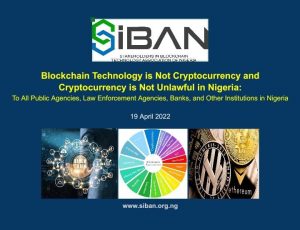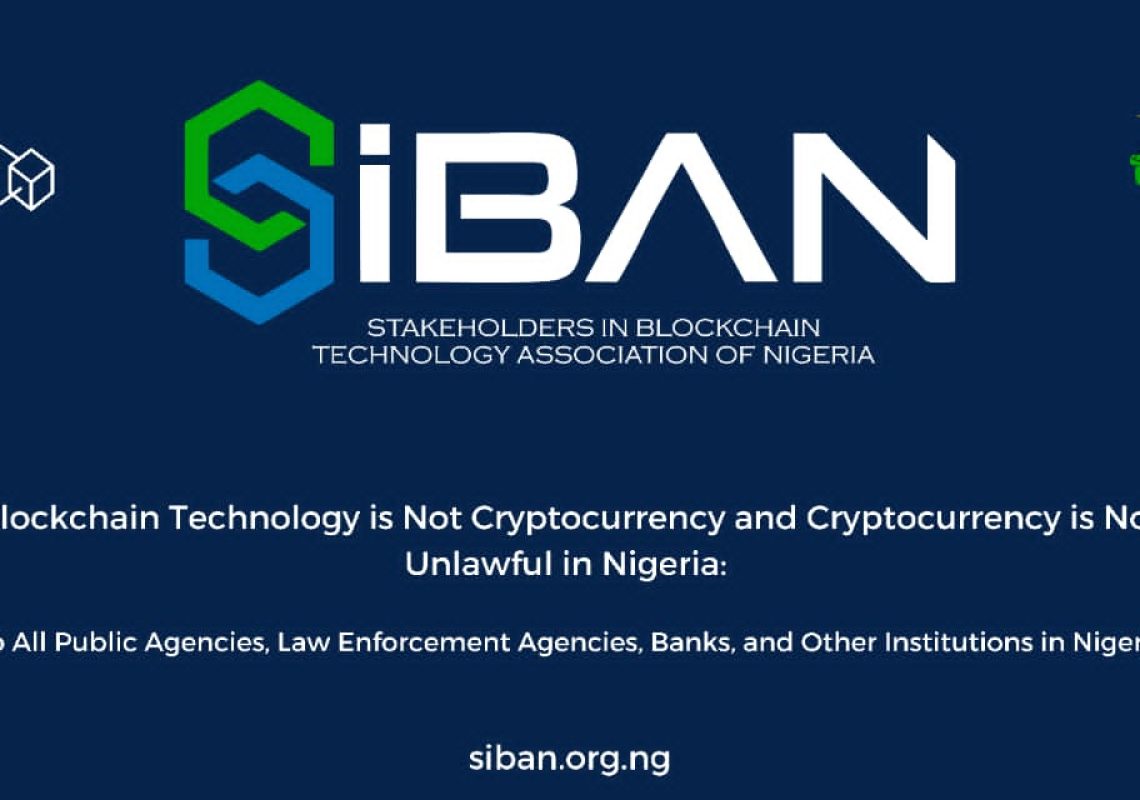Blockchain Technology is Not Cryptocurrency and Cryptocurrency is Not Unlawful in Nigeria: To All Public Agencies, Law Enforcement Agencies, Banks, and Other Institutions in Nigeria.
A Press Release By Stakeholders in Blockchain Technology Association of Nigeria (SiBAN)
19 April 2022
About SiBAN
Founded in 2018 on the right to peaceful assembly and association under section 40 of the Nigerian Constitution, Stakeholders in Blockchain Technology Association of Nigeria (SiBAN) is an association of blockchain-industry players that adopt self-regulation towards promoting a bigger, friendlier, and safer blockchain industry in Nigeria. We work with our registered members to promote a fair and safe virtual asset market for innovators through self-regulation, education, and collaboration with relevant private and public bodies. SiBAN is a member of the Blockchain Industry Coordinating Committee of Nigeria (BICCON); Blockchain Associations Forum (BAF) by the British Blockchain Association (BBA); Centre for Evidence-Based Blockchain (CEEB); Fintech Alliance Coordinating Team (FACT); Global Digital Asset & Cryptocurrency Association (Global DCA); and a key stakeholder recognized in the National Blockchain Adoption Strategy by the Federal Ministry of Communications & the Digital Economy and the National Information Technology Development Agency (NITDA).
Blockchain technology is not cryptocurrency.
Blockchain technology is not cryptocurrency. Blockchain enables anything of value, including currencies, identities, information, intellectual property, securities, and votes, to be stored, managed, or transferred efficiently, securely, and transparently, without a central authority or third party. Blockchain is applied in agriculture, aviation, banking & finance, entertainment, health, international trade, manufacturing, oil & gas, real estates, sports, telecommunications, transportation, and many other industries and sectors.
Just like Artificial Intelligence (AI), Big Data, Internet of Things (IoT), blockchain is an emerging technology, therefore no law or regulation is required to make blockchain acceptable in Nigeria. In any case, the Federal Ministry of Communications and the Digital Economy, through the National Information Technology Development Agency (NITDA), has published a National Blockchain Adoption Strategy that recognizes blockchain technology in the country. One of the many applications of blockchain is cryptocurrency. Cryptocurrency is created, stored, and transferred with the use of blockchain technology. According to the Financial Action Task Force (FATF), virtual currency is a digital representation of value that can be digitally traded and functions as (1) a medium of exchange; and/or (2) a unit of account; and/or (3) a store of value, but [may] not have legal tender status.
Cryptocurrency is not unlawful in Nigeria.
Cryptocurrency or virtual currency itself is not unlawful in Nigeria. Under Nigerian law today, it is neither a civil nor a criminal offense to buy, sell, or store cryptocurrency. The use of cryptocurrency as a medium of exchange, investment asset, or store of value is a legitimate act in Nigeria. Also, contrary to the common belief, cryptocurrencies that run on public blockchains such as bitcoin, Ethereum, and Litecoin for example, are traceable and transparent, thus they support investigations by law-enforcement agencies. Capacity building is critical here.
The Central Bank of Nigeria (CBN) cryptocurrency directive of 5 February 2021 to deposit money banks (DMBs), nonbank financial institutions (NBFIs), and other financial institutions (OFIs) in Nigeria is restricted to cryptocurrency transactions in the banking and financial system only. Cryptocurrency or cryptocurrency transactions outside the banking and financial system is not covered by the CBN cryptocurrency directive. Therefore, as long as a cryptocurrency transaction is not facilitated by a DMB, NBFI, or OFI, any person or entity is lawfully entitled to engage in it.
The CBN cryptocurrency directive does not ban cryptocurrency in Nigeria. Speaking on behalf of the Governor of the CBN at the 30th seminar for Finance Correspondents and Business Editors in Abuja FCT, March 2021, Adamu Lamtek, Deputy Governor of the CBN clarified that the CBN did not ban cryptocurrency activity in the country. In the words of Mr. Lamtek, “[t]he CBN did not place restrictions from [sic] use of cryptocurrencies, and we are not discouraging people from trading in them. What we have done was to prohibit transactions on cryptocurrencies in the banking sector.” By the way, a Federal High Court (Abuja division) in Governor CBN v Rise Vest Technologies Ltd & Others [suit no. FHC/ABJ/CS/822/2021] has questioned the validity of the CBN cryptocurrency directive since an offense in Nigeria must be defined in a written law, not in a mere circular.
Public agencies and law enforcement agencies should stop the demonization, discrimination, and stigmatization of blockchain and cryptocurrency in Nigeria. Capacity building is recommended.
We therefore humbly and respectfully ask all public agencies, departments, parastatals, and ministries, including the Corporate Affairs Commission (CAC) and the Nigeria Customs Service, as well as law enforcement agencies, including the Nigeria Financial Intelligence Unit (NFIU), the Nigeria Police, and the Economic and Financial Crimes Commission (EFCC), to please take note of the position of law and fact above. From time to time, instances of undue arrest and detention, bank-account blocking and closures, discrimination, extortion, harassment, intimidation, seizures, and queries, are experienced by persons or entities involved in any blockchain or cryptocurrency activity in Nigeria, particularly since the CBN cryptocurrency directive of 2021. Considering that the rate of legitimate cryptocurrency transactions globally is over 99% while the rate of cryptocurrency for illicit transactions is less than 1% (both in 2020 and 2021, according to Chainalysis Crypto Crime Report), the current demonization, discrimination, and stigmatization of cryptocurrency in the country is unwarranted. What the country urgently needs is risk-based regulation for cryptocurrency activities. We recommend capacity building.
Banks and other financial institutions should appreciate the difference between blockchain technology and cryptocurrency in their relationships with existing and potential customers. We recommend capacity building.
All DMBs, NBFIs, OFIs in the country must stop denying banking and financial services to individuals and entities only because these individuals or entities adopt, apply, develop, market, use, or promote blockchain technology. Where the blockchain product or service in question does not involve cryptocurrency, DMBs, NBFIs, and OFIs should not deny banking and financial services to these individuals and entities by relying on the CBN cryptocurrency directive.
For the record, blockchain and cryptocurrency are not the same. If treated as the same, the CBN’s very own blockchain-powered eNaira and any other blockchain-powered product or service in the country would be affected in Nigeria’s banking and financial system as well. This, of course, is not the intention of the CBN. We recommend capacity building in blockchain and cryptocurrency, particularly AML-CFT for virtual assets, to banks and other financial institutions.
All stakeholders in the blockchain and crypto industry must adhere to the rule of law and regulators should consider risk-based regulation.
As law-abiding citizens in a democratic state governed by a constitutional government where the Constitution guarantees the fundamental rights of every Nigerian, we expect both public and private sectors in Nigeria to adhere to the rule of law at all times. At SiBAN, we will continue to promote anti-money laundering and combating the financing of terrorism (AML-CFT) compliance, and other best practices amongst our registered members. We are always ready to collaborate with relevant agencies in this regard. Where the rights of our members are violated, we will explore administrative and legal options to seek redress.
History shows us that every innovation is accompanied by opportunities as well as risks. Blockchain technology and its cryptocurrency use case are no exception. With global blockchain and cryptocurrency adoption increasing daily, a risk-based regulation is the approach we recommend to regulators. The Basel Committee on Banking Supervision of the Bank for International Settlements (BIS), FATF, International Organization of Securities Commissions (IOSCO), and a number of other organizations also recommend a risk-based approach. Apart from risk-based regulation, Nigeria needs advocacy programs, specific education, and constant mass engagement and collaboration to equip the public and the regulators with understanding of blockchain. The United Kingdom, the United States, and other jurisdictions, including Mauritius and South Africa, are adopting regulations that help minimize risks while maximizing opportunities. As a pro-innovation and pro-regulation association, SiBAN welcomes policy & regulatory engagements as well as collaboration in this regard.
Contact SiBAN: Email: info@siban.org.ng; Twitter: @OfficialSiban; Linkedin: SiBAN; Website: https://siban.org.ng
Senator Ihenyen, President
president@siban.org.ng
Obinna Iwuno, Executive Secretary
sec@siban.org.ng








